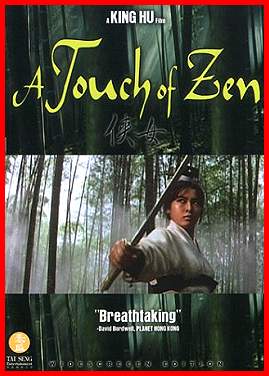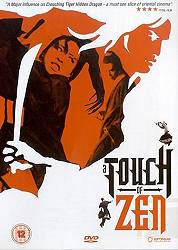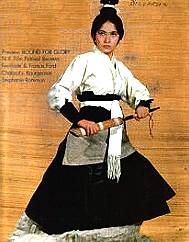|
|
| Sei in: Cinema e Medioevo ® Indice alfabetico dei film |
A TOUCH OF ZEN - LA FANCIULLA CAVALIERE ERRANTE
(Hsia nu)
1969, regia di King Hu

Scheda: Nazione: Taiwan - Produzione: International Film Company, Lian Bang, Union Film Company - Soggetto: da un racconto di Pu Songling - Sceneggiatura: King Hu - Fotografia: Yeh-hsing Chou, Hui-ying Hua - Montaggio: Jinquan Hu, King Hu - Scenografie: Zou Chiliang, Hing Hu, Vhen Shanglin - Musiche: Tai Kong Ng, Dajiang Wu - Formato: Eastmancolor, linguaggio mandarino - Durata: 200' (177').
Cast: Billy Chan, Ping-Yu Chang, Roy Chiao, Shih Chun, Hsue Han, Yin-Chieh Han, Feng Hsu, Ching-Ying Lam, Tien Miao, Hong Qiao, Peng Tien, Cien Tsao, Pai Ying, Sammo Hung Kam-Bo.


![]() Trama e commenti:
cinematografo.it
-
kataweb
-
film.spettacolo.virgilio.it -
mymovies.it: «Liberamente
ispirato a un libro di racconti di Piu Sung-Ling (1640-1715), è un vasto
affresco epico-avventuroso con risvolti fantastici la cui azione ha per sfondo
un villaggio della Cina settentrionale nell'epoca Ming (1367-1643) e per
personaggi principali la bella, valorosa e perseguitata figlia (H. Feng) di un
ministro morto sotto le torture, che s'è nascosta in una casa infestata dai
fantasmi; un giovane povero (S. Chun), pittore e letterato; un generale
travestito da cieco e un pacifico monaco buddista, esperto in arti marziali, le
cui ferite si rigenerano al sole e il cui sangue si tramuta in oro. Si può
dividere in tre parti: la prima ha le cadenze di un racconto del mistero con
risvolti ironici; la seconda mette in scena duelli all'arma bianca che si
trasformano in fantasiosi e magici balletti (notevole la sequenza di un
combattimento collettivo notturno, vinto dal giovane pittore e dai suoi amici
perseguitati dalla polizia segreta dei Ming con una serie di marchingegni);
nella terza parte l'azione spettacolare lascia il posto a un misticismo
visionario: vi si suggerisce come l'etica dello Zen – precisione, rigore,
controllo di sé, ascetismo, efficacia, lealtà – si traduce in gesto e azione. 4°
film di King Hu, raffinato scenografo e coreografo, pur non mancando di
squilibri, di prolissità e di passaggi opachi, è uno splendido esempio di cinema
come fonte di avventura, meraviglia, magia spettacolare, organizzazione del
movimento nello spazio. In concorso a Cannes nel 1975, in Italia è stato visto
soltanto sui teleschermi».
Trama e commenti:
cinematografo.it
-
kataweb
-
film.spettacolo.virgilio.it -
mymovies.it: «Liberamente
ispirato a un libro di racconti di Piu Sung-Ling (1640-1715), è un vasto
affresco epico-avventuroso con risvolti fantastici la cui azione ha per sfondo
un villaggio della Cina settentrionale nell'epoca Ming (1367-1643) e per
personaggi principali la bella, valorosa e perseguitata figlia (H. Feng) di un
ministro morto sotto le torture, che s'è nascosta in una casa infestata dai
fantasmi; un giovane povero (S. Chun), pittore e letterato; un generale
travestito da cieco e un pacifico monaco buddista, esperto in arti marziali, le
cui ferite si rigenerano al sole e il cui sangue si tramuta in oro. Si può
dividere in tre parti: la prima ha le cadenze di un racconto del mistero con
risvolti ironici; la seconda mette in scena duelli all'arma bianca che si
trasformano in fantasiosi e magici balletti (notevole la sequenza di un
combattimento collettivo notturno, vinto dal giovane pittore e dai suoi amici
perseguitati dalla polizia segreta dei Ming con una serie di marchingegni);
nella terza parte l'azione spettacolare lascia il posto a un misticismo
visionario: vi si suggerisce come l'etica dello Zen – precisione, rigore,
controllo di sé, ascetismo, efficacia, lealtà – si traduce in gesto e azione. 4°
film di King Hu, raffinato scenografo e coreografo, pur non mancando di
squilibri, di prolissità e di passaggi opachi, è uno splendido esempio di cinema
come fonte di avventura, meraviglia, magia spettacolare, organizzazione del
movimento nello spazio. In concorso a Cannes nel 1975, in Italia è stato visto
soltanto sui teleschermi».
![]() Plot Summary, Synopsis, Review:
IMDb -
movies.nytimes.com -
entertainment.msn.com -
antville.org
-
allmovie.com:
«An influential martial arts film and an acknowledged influence on Ang Lee's
amazing Crouching Tiger, Hidden Dragon, King Hu's A Touch of
Zen opens with young scholar Ku Shen-chai working at his portraiture stand in
a small frontier town. He lives with his nagging mother in a supposedly haunted,
rundown house at the edge of the abandoned Ching Liu estate. One day, a stranger
named Ou-Yang Yin asks for his picture to be painted, and then suddenly leaves.
Soon, another stranger -- this time a beautiful woman named Yang Hui-Ching --
suddenly moves into the complex next door. The presence of these strangers has
an increasingly unnerving effect on Ku, and he rightfully comes to believe that
the entire town is involved in some bizarre political intrigue. After a night of
passion between Ku and Yang, Ou-Yang Yin stages a surprise attack on the
compound, which Yang surprisingly thwarts with dazzling aplomb. Yang reveals to
him that her father was an honorable general executed due to the nefarious
doings of the powerful Eunuch Wei. With the aid of General Shih and Lu (who pose
as the town's blind beggar and herb vendor respectively), Yang was spirited away
first to a monastery where she learned martial arts and then to Ku's remote
corner of China. Ou-Yang Yin, Eunuch Wei's henchman, has in turn vowed to pursue
her to the ends of the earth. As Ou-Yang Yin rallies Wei's army to the walled
estate, Ku -- having spent a lifetime researching military history -- devises a
brilliant strategy to crush the siege and win the heart of this most unusual
woman. Though his plan works, he fails to win the loyalty of Yang; she flees
into the night as Ku slept. After searching desperately, Ku finds her in the
same monastery where she learned kung-fu. Now a Buddhist nun, she hands over
their child to him and sends him packing. Realizing that Ku is in danger, Yang
and her mentor -- a saintly abbot -- then set out to protect him. Suddenly out
of nowhere, Hsu Hsien-Chen -- the profoundly evil army commander of Eunuch Wei
-- confronts the abbot and an all-out battle between good and evil ensues.
Screened at the 1975 Cannes Film Festival and winning a technical prize, this
was the first Chinese language film ever to win a major western film festival
award» (Jonathan Crow).
Plot Summary, Synopsis, Review:
IMDb -
movies.nytimes.com -
entertainment.msn.com -
antville.org
-
allmovie.com:
«An influential martial arts film and an acknowledged influence on Ang Lee's
amazing Crouching Tiger, Hidden Dragon, King Hu's A Touch of
Zen opens with young scholar Ku Shen-chai working at his portraiture stand in
a small frontier town. He lives with his nagging mother in a supposedly haunted,
rundown house at the edge of the abandoned Ching Liu estate. One day, a stranger
named Ou-Yang Yin asks for his picture to be painted, and then suddenly leaves.
Soon, another stranger -- this time a beautiful woman named Yang Hui-Ching --
suddenly moves into the complex next door. The presence of these strangers has
an increasingly unnerving effect on Ku, and he rightfully comes to believe that
the entire town is involved in some bizarre political intrigue. After a night of
passion between Ku and Yang, Ou-Yang Yin stages a surprise attack on the
compound, which Yang surprisingly thwarts with dazzling aplomb. Yang reveals to
him that her father was an honorable general executed due to the nefarious
doings of the powerful Eunuch Wei. With the aid of General Shih and Lu (who pose
as the town's blind beggar and herb vendor respectively), Yang was spirited away
first to a monastery where she learned martial arts and then to Ku's remote
corner of China. Ou-Yang Yin, Eunuch Wei's henchman, has in turn vowed to pursue
her to the ends of the earth. As Ou-Yang Yin rallies Wei's army to the walled
estate, Ku -- having spent a lifetime researching military history -- devises a
brilliant strategy to crush the siege and win the heart of this most unusual
woman. Though his plan works, he fails to win the loyalty of Yang; she flees
into the night as Ku slept. After searching desperately, Ku finds her in the
same monastery where she learned kung-fu. Now a Buddhist nun, she hands over
their child to him and sends him packing. Realizing that Ku is in danger, Yang
and her mentor -- a saintly abbot -- then set out to protect him. Suddenly out
of nowhere, Hsu Hsien-Chen -- the profoundly evil army commander of Eunuch Wei
-- confronts the abbot and an all-out battle between good and evil ensues.
Screened at the 1975 Cannes Film Festival and winning a technical prize, this
was the first Chinese language film ever to win a major western film festival
award» (Jonathan Crow).
![]() Approfondimenti: Movie
Review
Approfondimenti: Movie
Review